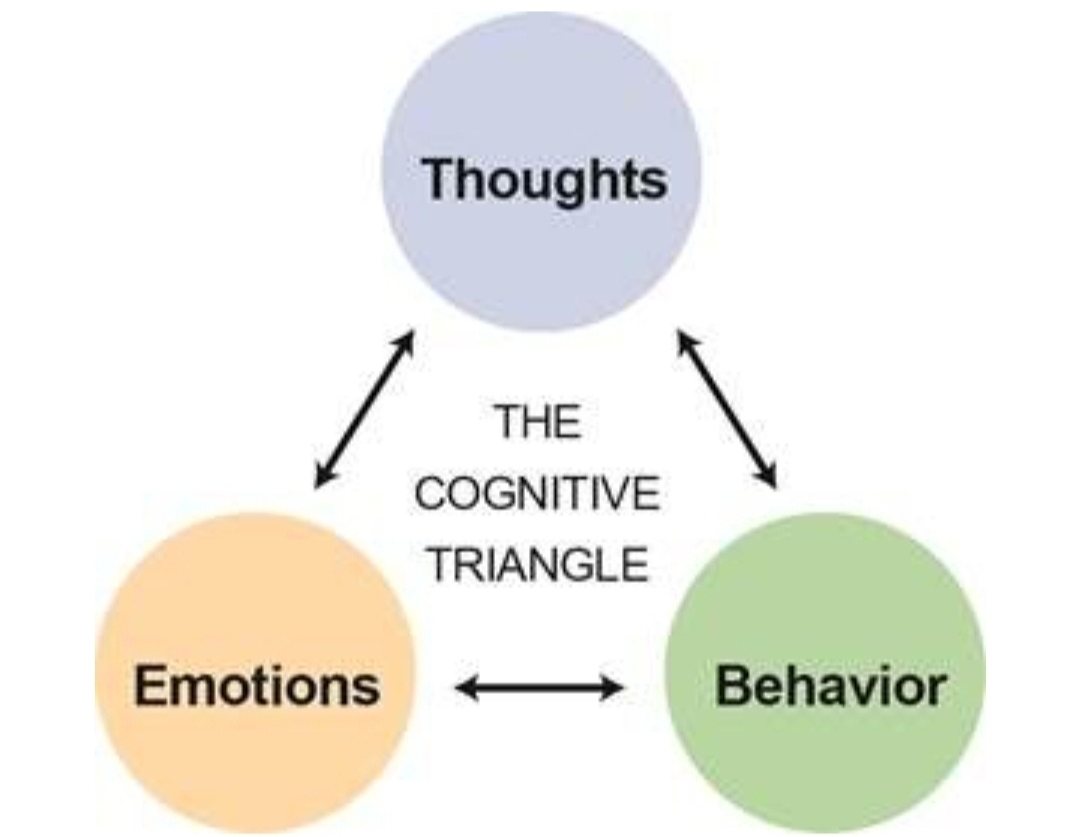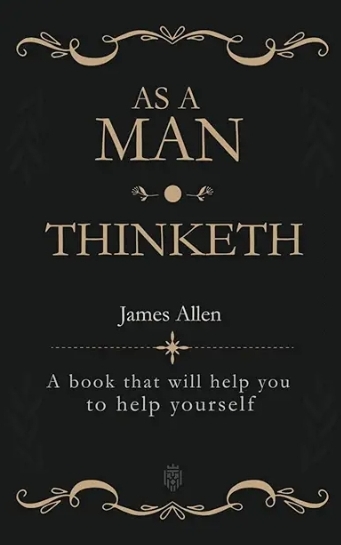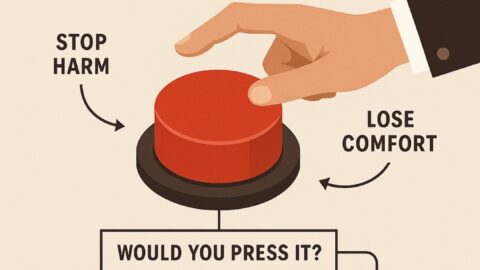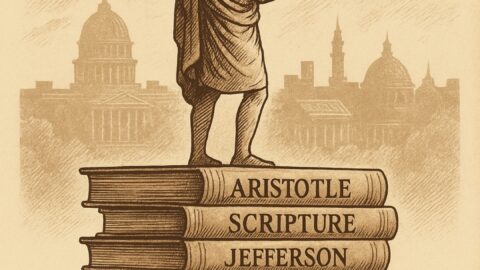As a Man Thinketh by James Allen aligns closely with the principles of the Cognitive Triangle, which emphasizes the interconnected relationship between thoughts, feelings, and behaviors.

Let’s break it down:
Core Concept of As a Man Thinketh
James Allen’s central idea is:
“A man is literally what he thinks, his character being the complete sum of all his thoughts.”
- Thoughts Shape Reality: Our mindset determines our actions, habits, and ultimately our destiny.
- Positive Thoughts = Positive Outcomes: By cultivating positive, healthy, and growth-oriented thoughts, individuals can influence their emotions and behaviors in a productive way.
- Negative Thoughts = Negative Outcomes: Allowing negative or self-destructive thoughts to dominate will create cycles of self-doubt, fear, and stagnation.
The Cognitive Triangle
The Cognitive Triangle is a foundational model in Cognitive Behavioral Therapy (CBT) that highlights how thoughts, emotions, and behaviors are interconnected:
- Thoughts → Influence emotions.
- Emotions → Influence behaviors.
- Behaviors → Reinforce thoughts.
Example:
- Thought: “I am capable of success.”
- Emotion: Confidence, optimism.
- Behavior: Take positive action, work diligently.
- Reinforcement: Success validates the thought.
If the thought was negative:
- Thought: “I will fail no matter what I do.”
- Emotion: Fear, anxiety.
- Behavior: Procrastination, avoidance.
- Reinforcement: Failure reinforces the belief.
Practical Application from James Allen’s Philosophy
- Mind Control: Guard your mind against self-defeating or negative beliefs.
- Self-Reflection: Regularly examine your thoughts and replace harmful ones with constructive alternatives.
- Growth Mindset: Embrace challenges as opportunities to grow.
- Emotional Regulation: When negative feelings arise, trace them back to their root thought and reframe it.
- Accountability: Recognize that your circumstances are often a reflection of your dominant thoughts.
Example from As a Man Thinketh
“The soul attracts that which it secretly harbors; that which it loves, and also that which it fears.”
This mirrors the Cognitive Triangle by showing how internal thoughts (harbored fears or desires) directly impact feelings and external outcomes.

Insight
- Control your thoughts to influence your emotions and guide your behavior.
- A positive mindset sets the foundation for emotional resilience and purposeful action.
- Both As a Man Thinketh and the Cognitive Triangle remind us that mindset is the starting point for transformation.
In essence, “You are today where your thoughts have brought you; you will be tomorrow where your thoughts take you.” – James Allen
As a Man Thinketh by James Allen: Detailed Overview
James Allen’s As a Man Thinketh is a classic work on the power of thoughts in shaping one’s life. First published in 1903, this short but profound book has inspired countless readers with its core message: our thoughts shape our character, actions, and ultimately, our destiny. Below is an in-depth exploration of the book’s key themes, principles, and insights.
The Central Premise: “You Are What You Think”
The book asserts that our thoughts determine our character, actions, and circumstances. Allen draws parallels between the mind and a garden, emphasizing that:
- Cultivated thoughts (positive and disciplined) yield a fruitful and fulfilling life.
- Neglected or negative thoughts invite chaos, failure, and unhappiness.
- Responsibility for outcomes lies with the thinker, as external circumstances often mirror internal thoughts.
Allen challenges readers to take full accountability for their mental landscapes and understand that their realities are a direct reflection of their inner worlds.
Key Themes and Insights
A. Thought and Character
Allen explains that a person’s character is shaped by their habitual thoughts. He emphasizes that:
- Noble thoughts lead to a virtuous and strong character.
- Negative or impure thoughts degrade character over time.
- Thoughts are seeds that eventually manifest in actions, habits, and ultimately, destiny.
Quote: “A man is literally what he thinks, his character being the complete sum of all his thoughts.”
B. The Power of Thought in Circumstances
Allen argues that external circumstances do not arise by chance but are shaped by internal thoughts. He divides these into:
- Harmonious Thoughts: Lead to success, health, and happiness.
- Disharmonious Thoughts: Bring failure, illness, and discontent.
While he acknowledges external challenges, Allen insists that inner strength, cultivated through positive thinking, can overcome adversity.
Quote: “Circumstance does not make the man; it reveals him to himself.”
C. The Connection Between Thought and Health
The book suggests that mental states directly impact physical health:
- Positive thoughts promote vitality and energy.
- Negative thoughts like worry, fear, and resentment deplete energy and lead to illness.
Allen advises readers to cultivate serenity, optimism, and self-control to achieve physical and mental well-being.
D. Thought and Achievement
Allen links personal achievement to mental clarity and focus:
- Purposeful Thinking: People who set clear goals and focus on them attract success.
- Drifting Minds: Those without clear purpose struggle to succeed.
Quote: “He who cherishes a beautiful vision, a lofty ideal in his heart, will one day realize it.”
E. Serenity as the Ultimate Virtue
Allen views serenity as the ultimate demonstration of mastery over one’s thoughts. A serene mind reflects inner strength and clarity, untouched by external turmoil.
Quote: “Calmness of mind is one of the beautiful jewels of wisdom.”
Practical Lessons from the Book
A. Monitor Your Thoughts
- Regularly assess whether your thoughts are positive, productive, and aligned with your goals.
- Replace negative or harmful thoughts with constructive and uplifting ones.
B. Take Responsibility for Your Life
- Stop blaming external circumstances or others for your situation.
- Recognize that your inner state creates your reality and commit to change.
C. Cultivate Noble Ideals
- Develop a clear vision of who you want to become and what you want to achieve.
- Focus on this ideal daily, allowing it to guide your thoughts and actions.
D. Practice Serenity and Self-Control
- Train your mind to remain calm in the face of challenges.
- Avoid impulsive reactions; instead, respond with wisdom and composure.
E. Persist with Discipline
- Growth requires consistent effort, just as a garden requires regular care.
- Discipline your thoughts to align with your aspirations and values.
Impact and Relevance of the Book
As a Man Thinketh remains relevant over a century after its publication because it addresses timeless truths about the human condition:
- It empowers readers to recognize their agency in shaping their lives.
- It provides practical wisdom for cultivating a positive mindset.
- It inspires a commitment to self-improvement and accountability.
In modern contexts, Allen’s ideas resonate with principles from psychology, neuroscience, and self-help, such as the concepts of growth mindset, neuroplasticity, and mindfulness.
Final Thoughts
James Allen’s As a Man Thinketh is a profound exploration of the transformative power of thought. It serves as a guide for anyone seeking to live with purpose, overcome challenges, and create a fulfilling life. By emphasizing accountability, discipline, and the pursuit of noble ideals, the book encourages readers to become conscious architects of their destinies.
Quote to Remember:
“Dream lofty dreams, and as you dream, so shall you become. Your vision is the promise of what you shall one day be.”







